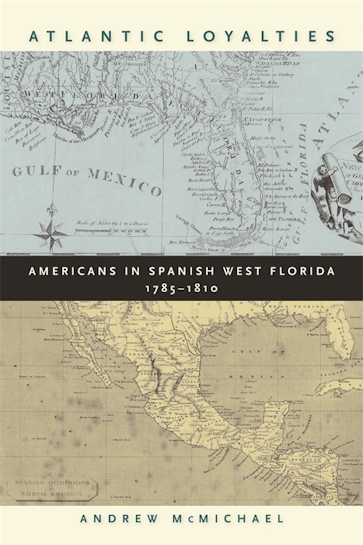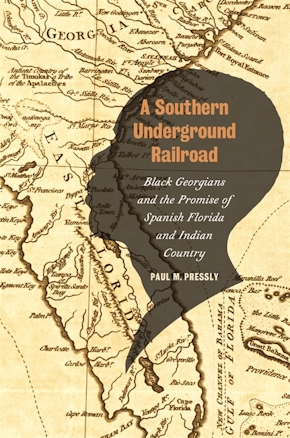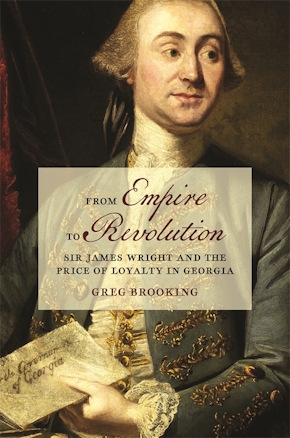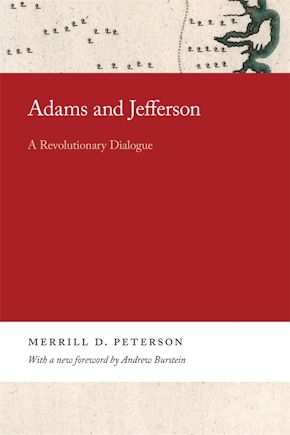Atlantic Loyalties
Americans in Spanish West Florida, 1785-1810
Title Details
Pages: 240
Illustrations: 2 figures
Trim size: 6.000in x 9.000in
Formats
Paperback
Pub Date: 01/25/2008
ISBN: 9-780-8203-3023-5
List Price: $30.95
eBook
Pub Date: 01/25/2010
ISBN: 9-780-8203-6968-6
List Price: $29.95
Related Subjects
Atlantic Loyalties
Americans in Spanish West Florida, 1785-1810
Skip to
- Description
- Reviews
Integrating social, cultural, economic, and political history, this is a study of the factors that grounded—or swayed—the loyalties of non-Spaniards living under Spanish rule on the southern frontier. In particular, Andrew McMichael looks at the colonial Spanish administration’s attitude toward resident Americans. The Spanish borderlands systems of slavery and land ownership, McMichael shows, used an efficient system of land distribution and government patronage that engendered loyalty and withstood a series of conflicts that tested, but did not shatter, residents’ allegiance. McMichael focuses on the Baton Rouge district of Spanish West Florida from 1785 through 1810, analyzing why resident Anglo-Americans, who had maintained a high degree of loyalty to the Spanish Crown through 1809, rebelled in 1810.
The book contextualizes the 1810 rebellion, and by extension the southern frontier, within the broader Atlantic World, showing how both local factors as well as events in Europe affected lives in the Spanish borderlands. Breaking with traditional scholarship, McMichael examines contests over land and slaves as a determinant of loyalty. He draws on Spanish, French, and Anglo records to challenge scholarship that asserts a particularly “American” loyalty on the frontier whereby Anglo-American residents in West Florida, as disaffected subjects of the Spanish Crown, patiently abided until they could overthrow an alien system. Rather, it was political, social, and cultural conflicts—not nationalist ideology—that disrupted networks by which economic prosperity was gained and thus loyalty retained.
One of the most impressive achievements of Atlantic Loyalties is to establish a road map for studying West Florida in particular and the southern borderlands in general. McMichael offers an important counterpart to the standard narrative of the system of British slavery that began in the upper South before heading South and West. Instead, we learn about a more complex and dynamic process through which enslavement and freedom, plantation agriculture and frontier settlement, regional connections and international tensions overlapped to shape life in North America.
—Peter Kastor, author of The Nation's Crucible: The Louisiana Purchase and the Creation of America
McMichael's book is a powerful argument for writing borderlands history from the ground up, concentrating on what actually happened in a given place and fitting that place into an Atlantic framework. The story of Anglo-American expansion into the Spanish borderlands has traditionally been told as the inevitable triumph of English liberty over Spanish tyranny. In this pathbreaking study, McMichael shows that government in the Baton Rouge district of West Florida was enlightened and mild and that Anglo settlers, whose allegiance was more practical than patriotic, were content to live under Spanish law as long as Spain was able to grant lands and protect property.
—Amy Turner Bushnell, author of Situado and Sabana: Spain's Support System for the Presidio and Mission Provinces of Florida
Atlantic Loyalties is the finest book written on the southern borderlands. Focusing upon an obscure region the Baton Rouge district of West Florida, he has carefully chronicled the political, economic, social, and cultural factors that gave context to the lives and loyalties of the French, Spanish, British, and American settlers. This is a revolutionary book that moves easily between the local and the international, revealing the shifting loyalties and abiding self-interest of the settlers.
—Virginia Meacham Gould, editor of Chained to the Rock of Adversity
Offers exceptionally well written, interesting, and innovative approaches that promise to breathe new interpretive life into what many may consider an old topic . . . As one of the stronger anthologies in the field published in recent years, this collection will be useful to specialists and students alike . . . the range of interpretations and the nuanced understandings of American slavery will certainly benefit scholars for years to come.
—Journal of Southern History
[Andrew] McMichael does a good job of describing the operations and end of twenty-five years of Spanish rule in West Florida. He uses a rich variety of archival sources to illustrate and establish his key points. This is bottom-up history that takes into account theoretical themes but is ever on the search for concrete evidence on which to base the more abstract claims. Others would do well to imitate his work.
—Eighteenth-Century Intelligencer
Atlantic Loyalties does an excellent job in placing West Florida into an international context. . . . An interesting book that sheds historical light on an area all-too-often downplayed or not mentioned at all.
—Journal of American History



